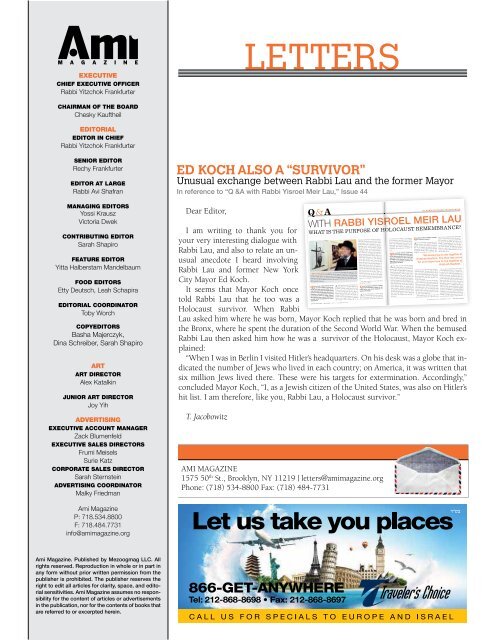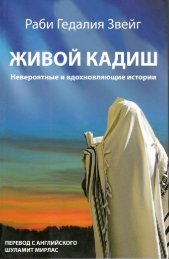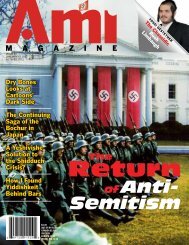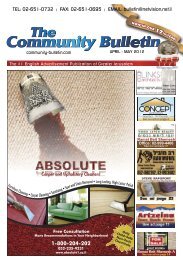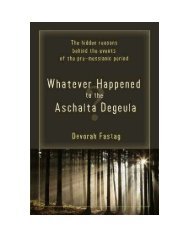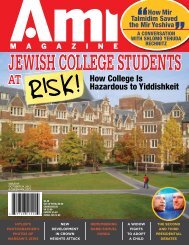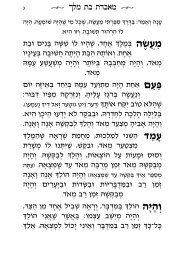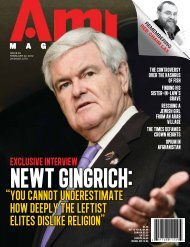4 - Jewish E-Books
4 - Jewish E-Books
4 - Jewish E-Books
Create successful ePaper yourself
Turn your PDF publications into a flip-book with our unique Google optimized e-Paper software.
EXECUTIVE<br />
CHIEF EXECUTIVE OFFICER<br />
Rabbi Yitzchok Frankfurter<br />
LETTERS<br />
CHAIRMAN OF THE BOARD<br />
Chesky Kauftheil<br />
EDITORIAL<br />
EDITOR IN CHIEF<br />
Rabbi Yitzchok Frankfurter<br />
SENIOR EDITOR<br />
Rechy Frankfurter<br />
EDITOR AT LARGE<br />
Rabbi Avi Shafran<br />
MANAGING EDITORS<br />
Yossi Krausz<br />
Victoria Dwek<br />
CONTRIBUTING EDITOR<br />
Sarah Shapiro<br />
FEATURE EDITOR<br />
Yitta Halberstam Mandelbaum<br />
FOOD EDITORS<br />
Etty Deutsch, Leah Schapira<br />
EDITORIAL COORDINATOR<br />
Toby Worch<br />
COPYEDITORS<br />
Basha Majerczyk,<br />
Dina Schreiber, Sarah Shapiro<br />
ART<br />
ART DIRECTOR<br />
Alex Katalkin<br />
JUNIOR ART DIRECTOR<br />
Joy Yih<br />
ADVERTISING<br />
EXECUTIVE ACCOUNT MANAGER<br />
Zack Blumenfeld<br />
EXECUTIVE SALES DIRECTORS<br />
Frumi Meisels<br />
Surie Katz<br />
CORPORATE SALES DIRECTOR<br />
Sarah Sternstein<br />
ADVERTISING COORDINATOR<br />
Malky Friedman<br />
ED KOCH ALSO A “SURVIVOR”<br />
Unusual exchange between Rabbi Lau and the former Mayor<br />
In reference to “Q &A with Rabbi Yisroel Meir Lau,” Issue 44<br />
Dear Editor,<br />
I am writing to thank you for<br />
your very interesting dialogue with<br />
Rabbi Lau, and also to relate an unusual<br />
anecdote I heard involving<br />
Rabbi Lau and former New York<br />
City Mayor Ed Koch.<br />
It seems that Mayor Koch once<br />
told Rabbi Lau that he too was a<br />
Holocaust survivor. When Rabbi<br />
Lau asked him where he was born, Mayor Koch replied that he was born and bred in<br />
the Bronx, where he spent the duration of the Second World War. When the bemused<br />
Rabbi Lau then asked him how he was a survivor of the Holocaust, Mayor Koch explained:<br />
“When I was in Berlin I visited Hitler’s headquarters. On his desk was a globe that indicated<br />
the number of Jews who lived in each country; on America, it was written that<br />
six million Jews lived there. These were his targets for extermination. Accordingly,”<br />
concluded Mayor Koch, “I, as a <strong>Jewish</strong> citizen of the United States, was also on Hitler’s<br />
hit list. I am therefore, like you, Rabbi Lau, a Holocaust survivor.”<br />
T. Jacobowitz<br />
Q&A<br />
AMI MAGAZINE<br />
1575 50 th St., Brooklyn, NY 11219 | letters@amimagazine.org<br />
Phone: (718) 534-8800 Fax: (718) 484-7731<br />
Q<br />
Your arrival at Buchenwald at the<br />
age of seven, hidden in a sack carried<br />
by your older brother, Naftali, is one<br />
of the most fascinating Holocaust survival<br />
stories I’ve ever encountered. But why is it<br />
What purpose does it serve? What are we<br />
importan to keep going back in memory<br />
to that dark period in <strong>Jewish</strong> history?<br />
actua ly giving the kedoshim by remembering<br />
them?<br />
A<br />
The kadoshim don’t need to get anything<br />
from us. “Harugei Malchus ein<br />
kol briah yecholah lamod bemichitzasam”<br />
[“Those who were murdered—no one<br />
can stand among them in their place.”]<br />
People such as Rabbi Akiva and the 10<br />
Harugei Malchus, and also a l of the kedoshim<br />
from every generation; they are<br />
found in the highest place in palmalya were. How they kept their emunah, how<br />
shel maalah, more so than a l of the they said Shema Yisrael and ani mamin,<br />
us to continue in their path. And, in truth,<br />
the best revenge is—as I discussed in the<br />
book—the continuation, th eternity. The<br />
immortality of the <strong>Jewish</strong> people is in our<br />
BY RABBI YITZCHOK FRANKFURTER<br />
WITH RABBI YISROEL MEIR LAU<br />
WHAT IS THE PURPOSE OF HOLOCAUST REMEMBRANCE?<br />
Rabbi Lau viewing a photo of himself af ter<br />
he was liberated from Buchenwald.<br />
RABBI YISROEL MEIR LAU served as the Ashkenazi Chief Rabbi of Israel from 1993<br />
to 2003. He is currently the Chief Rabbi of Tel Aviv, Israel and chairman of Yad Vashem. He<br />
authored several seforim on halacha, and a commentary on Pirkei Avos. His best-se ling<br />
Hebrew autobiography was recently translated into English, titled “Out of the Depths.” Last<br />
week, Rav Lau sat with Rabbi Frankfurter, discussing his book and why he found it importan<br />
to publish his life story.<br />
Tanaim and Amoraim; they don’t need us.<br />
They only need to know tha they have a<br />
continuation. They need to know “Shelo<br />
yitosh Hashem amo v’nachalaso lo Yaazov.”<br />
[Hashem won’t forsake His people and<br />
His portion He won’t abandon.] When<br />
people say Yizkor, or Kel malai rachamim<br />
or Kaddish, they aren’t doing anyone a<br />
favor. The favor is for us. By remembering<br />
the kedoshim we fulfi l the injunction,<br />
“Datah mayayin bataa.” [Know where you<br />
came from.] We need to know who our<br />
fathers and mothers were. The memorials<br />
are more for the sake of present and<br />
future generations, so that we should<br />
know our roots, and the foundations on<br />
which Klal Yisroel stands. If we don’t remember<br />
the Holocaust, chas v’shalom, the<br />
younger generation wi l think that we can<br />
start over, with no past. But there is no<br />
future when there is no past. When we<br />
remember the past, not for revenge, and<br />
not as a favor to the korbonos, but rather<br />
for ourselves and for future generations,<br />
we do so to remember what happened to<br />
us.<br />
the memory of them.<br />
They don’t need us; it is we who need<br />
Q<br />
Is remembering, therefore, a matter<br />
of kavod hachayim, respect for the<br />
living, rather than kavod hamaysim, respect<br />
for the dead?<br />
A<br />
Yes. It’s yikra d’chaya, to know where<br />
you came from and who your parents<br />
roots.<br />
Q<br />
Do you think that the people who<br />
lived through tha time period, such<br />
as you and your brother, have something<br />
aside from memories to give to the next<br />
generation? If so, what is the basic message<br />
that your generation, which is now<br />
ge ting older, can relay?<br />
A<br />
First, that you can’t rely on anyone,<br />
only on our Father in Heaven. Not on<br />
people. What didn’t we give to Poland for<br />
over 1,000 years? What didn’t we give Germany,<br />
with our Rothschilds, our Einsteins generations back. In spite of a l the differences,<br />
everyone understood that we are a l<br />
overwhelmed by the “sun.” Emancipation.<br />
Jews. The enemies understood that we are<br />
even until the last minute. This obligates<br />
they initiated an Inquisition, Tach V’tat,<br />
Romans, Kristalnacht—a l so that Jews<br />
continuity. The chain is unbroken. We<br />
would abandon Yiddishkeit. The stronger<br />
remember the fundaments; we know the how to live together al Kiddush Hashem. the wind, though, the tighter the Jews<br />
Chassidim and misnagdim died together held on to their coats. They said “Shema<br />
al Kiddush Hashem. More religious; less<br />
religious; not religious at a l. Even misboolilim<br />
who had <strong>Jewish</strong> blood from six But we have a generation now that is<br />
and Mendolsohns, and so many other<br />
creative people of the world? We gave so<br />
lesson that we are the same people? That to teach the future generations that our<br />
many presents to Germany, and what did<br />
we get in return? Like Yosef in Mitzrayim,<br />
he saved Mitzrayim from hunger, and was<br />
there any protection for his children Me-<br />
which I wish to give over with a parable:<br />
throw them in the river?!“Shelo yadah es<br />
Yosef.” Phaaroh made no exceptions for<br />
The wind tried to blow o f a man’s coat,<br />
but the colder it got, the tighter the man<br />
held onto his coat, and it wouldn’t come<br />
then on, from before yetziyas Mitrayim o f. Then the sun made it hotter, and got<br />
until today, the number one message is:<br />
The emunah is like the coat. A l of the<br />
goyim always wanted us to get rid of our<br />
nashe and Efrayim, so that no one would<br />
Q<br />
A<br />
Is there another important message<br />
for us and our children?”<br />
The second thing to learn is this: We<br />
knew how to die together al Kiddush<br />
Hashem. The time has come for us to learn<br />
the same people. Why don’t we learn the<br />
we are one nation?<br />
There is another important lesson here,<br />
There was once an argument between the<br />
sun and the wind over who wa stronger.<br />
Yosef’s children. Instead of making statues<br />
and stamps of Yosef’s face, they took a l of<br />
his sons and threw them in the river. From<br />
the man to take o f his coat.<br />
don’t rely.<br />
aderet, that we should be like a l the other<br />
nations. They tried to be like the wind—<br />
the decrees of Antiochus, the Greeks, the<br />
Yisroel,” and threw themselves into the fire<br />
like Avraham Avinu.<br />
“We knew how to die together al<br />
Kiddush Hashem. The time has come<br />
for us to learn how to live together al<br />
Kiddush Hashem.”<br />
It is in a l of the universities, and they try<br />
to marry into us with intermarriages, G-d<br />
forbid. In this time, my generation needs<br />
parents didn’t give up their emunah, even<br />
when it was hard. They had mesirus nefesh.<br />
How much more so, for you—the young<br />
generation—there’s no danger today in<br />
wearing tefi lin or wrapping oneself in a<br />
ta lis, no issur against blowing a shofar<br />
on Rosh Hashana, no prohibition against<br />
wearing a yarmulkeh or keeping Shabbos<br />
or kashrus. So if your parents and grandparents<br />
kept a l of these mitzvos, and were<br />
wi ling to sacrifice their lives for it, then<br />
you can keep the mitzvos without sacrific-<br />
24 AMI MAGAZINE // NOVEMBER 9, 2011 // 12 CHESHVAN, 5772 12 CHESHVAN, 5772 // NOVEMBER 9, 2011 // AMI MAGAZINE 25<br />
Ami Magazine<br />
P: 718.534.8800<br />
F: 718.484.7731<br />
info@amimagazine.org<br />
Ami Magazine. Published by Mezoogmag LLC. All<br />
rights reserved. Reproduction in whole or in part in<br />
any form without prior written permission from the<br />
publisher is prohibited. The publisher reserves the<br />
right to edit all articles for clarity, space, and editorial<br />
sensitivities. Ami Magazine assumes no responsibility<br />
for the content of articles or advertisements<br />
in the publication, nor for the contents of books that<br />
are referred to or excerpted herein.


